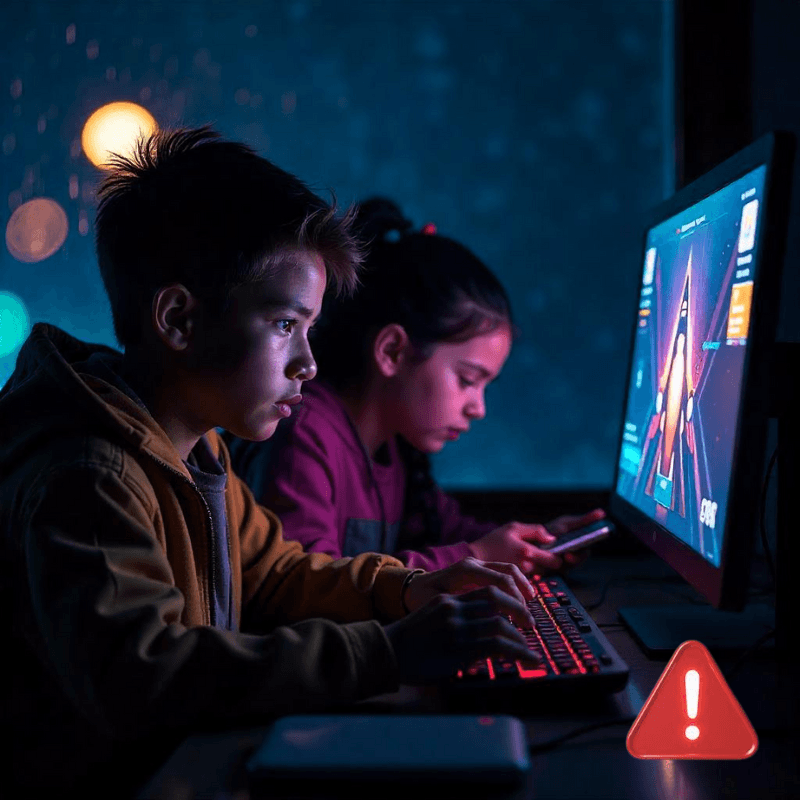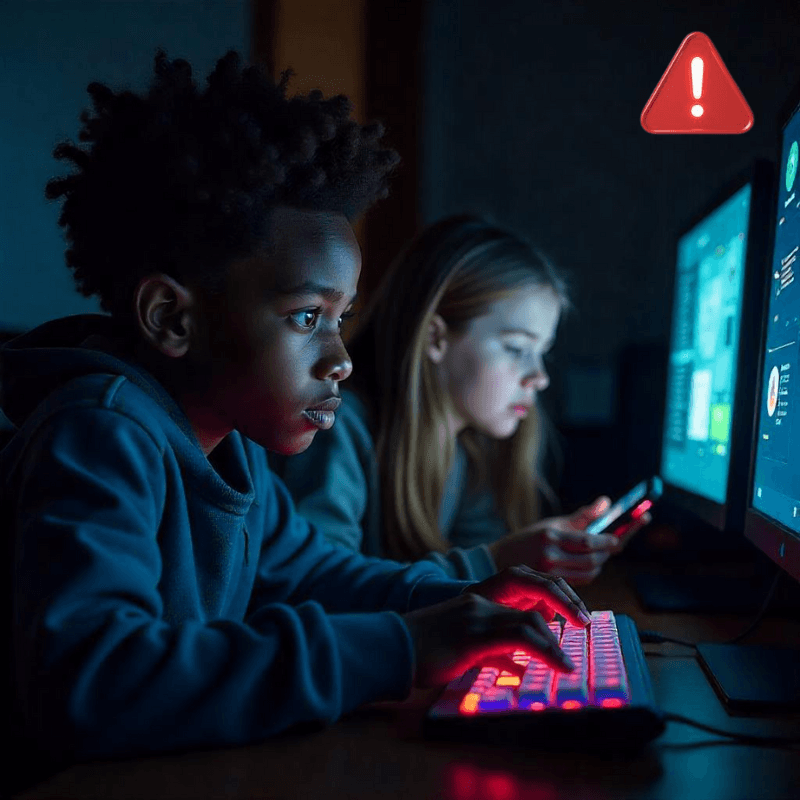
Children and teens are particularly vulnerable to gambling for a number of reasons:
Developing mind: The human brain is still developing until the age of 25, especially areas responsible for self-control and decision-making.
Natural curiosity: Young people tend to explore new technologies and platforms without realizing the risks.
Influence of social networks: Influencers and advertisements on social networks often promote gambling as something fun and profitable.
Lack of financial understanding: Many do not understand the real value of money or the consequences of losing large amounts of money online.
What are the Main Risks for Minors?
- Exposure to Prohibited Content
Illegal websites allow free access to minors, without age verification. - Unauthorized Financial Expenses
Young people can use their parents’ cards or make purchases in the app without authorization, generating debts. - Online Gaming Addiction
Games designed to be addictive can cause psychological dependence, affecting study, sleep and relationships. - Psychological Manipulation
Constant promises of “prizes” or “wins” create a false sense of control over chance. - Misleading Content
Some games simulate gambling or raffles, making the young person think they are playing when, in fact, they are participating in something illegal.
How Can Parents Protect Their Children?

- Early Education
Talk to children about the concept of chance, luck and risk. Teach them that gambling does not guarantee winnings, but rather the possibility of loss.
Tip: Use simple analogies, such as “It’s like betting on a coin toss — you might win once, but not every time.”
- Digital Monitoring
Use parental control tools to block access to gambling sites and limit spending on apps.
Recommended Tools:
Google Family Link (Android)
Screen Time (iOS)
Kaspersky Safe Kids
Qustodio
These tools allow you to:
Block downloads of inappropriate apps
Limit screen time
Restrict in-app purchases
- Set Clear Limits
Set clear rules for internet and mobile device use. Agree on times and types of games that are allowed.
✅ Example: “You can play Minecraft, but only with supervision and without purchasing extra items.”
- Review Statements and History
Regularly check bank statements and browsing history. If you notice suspicious charges, investigate immediately. - Frequent Conversations
Keep an open dialogue about what your child does online. Ask them what games they prefer and why.
Useful phrases:
“Have you ever seen anyone talking about gambling online?”
“How would you feel if you lost a lot of money gambling?”
- Avoid Normalizing Gambling
Even in sporting events or family lotteries, avoid treating gambling as something normal or positive. This can encourage early interest. - Teach Self-Protection
Teach your child to recognize signs of online scams or manipulation, such as:
Urgent messages (“Your account will be blocked!”)
Impossible offers (“Earn R$10,000 per day!”)
Emotional pressure (“Don’t let this chance slip away!”)
- Report Suspicious Activity
If your child has been the victim of a scam or fraudulent website, report it:
Reclame Aqui
Procon
Delegacia Virtual
Anatel (for illegal apps)
The Danger of “Mini-Games” Disguised as Gambling
There are many children’s games or entertainment that imitate gambling, such as:
Virtual slot machines in children’s apps
Loot boxes in games like Fortnite, FIFA Ultimate Team
Raffles and lucky wheels on YouTube channels
These elements condition children’s brains to associate immediate reward with luck, increasing the likelihood of future addictions.
Warning: These resources are not harmless — they train behaviors similar to those of real gambling.
Professional Support
If you notice that your child already has problematic habits with games or bets, seek professional help:
Psychologists specialized in digital addictions
Family and youth support groups
Child psychological care centers
Checklist for Parents:
ACTION –
Talk about the risks of gambling
Use parental controls on devices
Set clear rules for internet use
Check statements and history regularly
Be alert to changes in behavior
Report fraudulent activities
Conclusion
Online gambling poses a real danger to children and adolescents, especially due to its seductive nature and easy access. However, with education, monitoring and constant dialogue, parents have a fundamental role in preventing problems such as addiction, undue spending and exposure to inappropriate content.
The key is not to wait for something to happen to take action. Start early, be present and inform yourself about the risks of the digital world. This way, you will be preparing your child to deal with the internet in a conscious and safe way.


